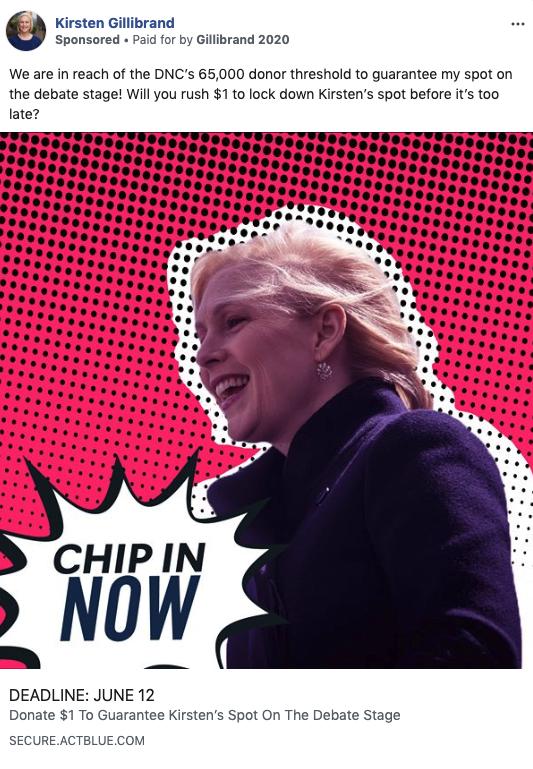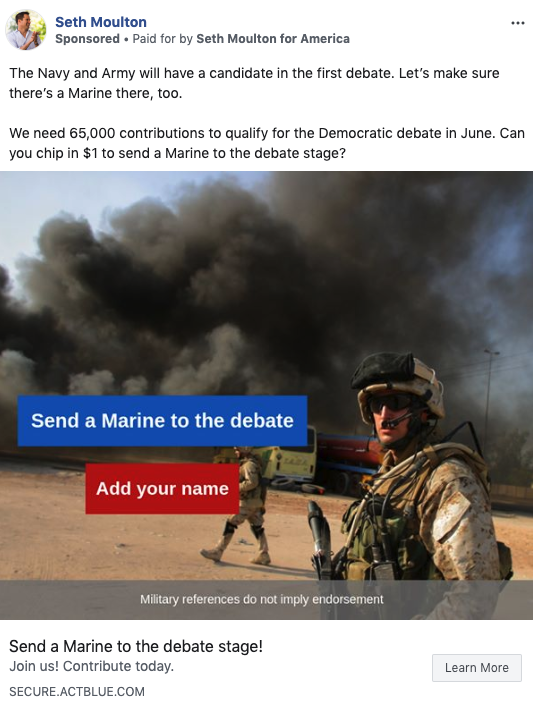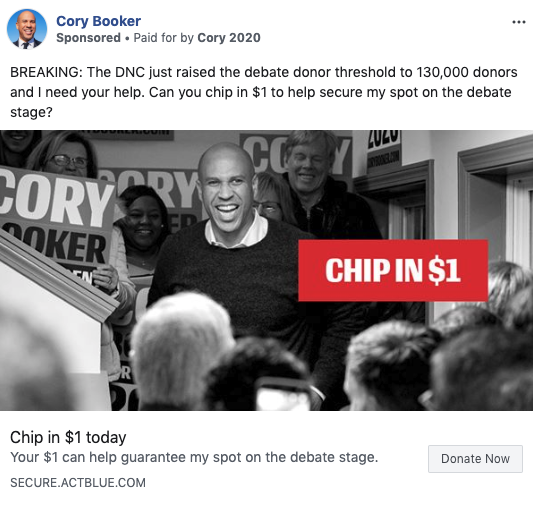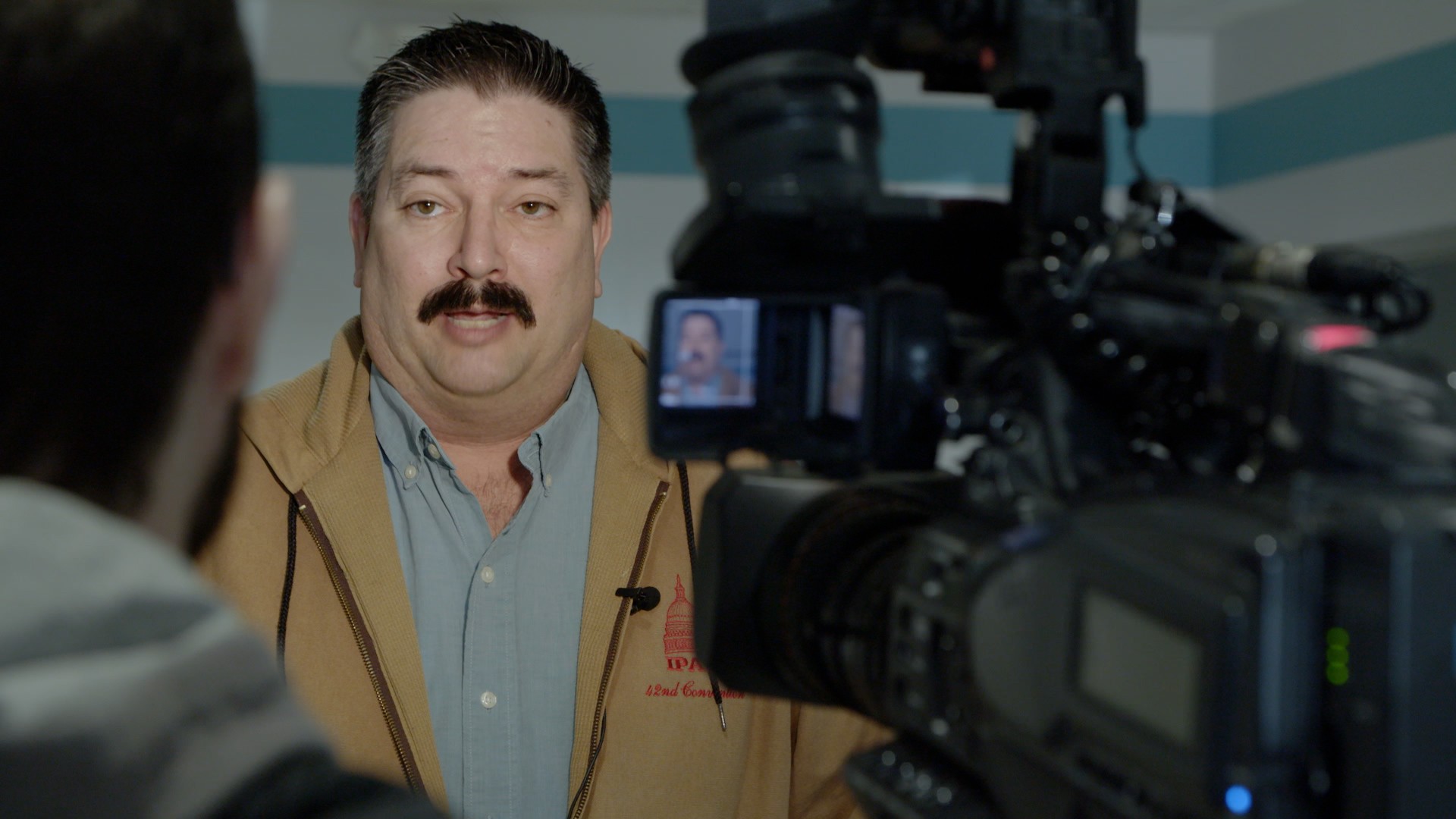For New Jersey Sen. Cory Booker, the announcement merited a “BREAKING” tag in a barrage of Facebook ads. Former Housing and Urban Development secretary Julian Castro called it “astounding.” Washington Gov. Jay Inslee, who's 68, gave it no less than two siren emojis in a Facebook post.The news? The Democratic National Committee announced its plan last week to cull the unruly field of 24 candidates for president by setting a 130,000-donor threshold to qualify for its third and fourth debates this fall. That move set off a scramble for cash on Facebook, inundating voters with fundraising appeals and blowing up ad prices.The new Democratic debate rules have made “Chip in” the unofficial, decidedly thirsty rallying cry for several campaigns desperate to make the cut. The resulting fight for small donors has helped Facebook rake in more than $1 million each week from the sprawling Democratic field, according to company figures.“ALERT: We need 130,000 donors this summer to be guaranteed a spot at the next Democratic debates,” Inslee’s page said in one version of a Facebook ad appealing for donations as low as $1. “Help keep Jay’s mission to defeat climate change front and center on the stage. Chip in before midnight!”But here’s the rub: Long-shot candidates may need to spend more on Facebook ads and other digital outreach than donors actually give to their campaigns.“There are plenty of people who qualify for the debate stage but could be bled dry by the process to get there,” said Niko Duffy, managing director of CommonWealth Media, a progressive digital strategy firm.Small, online donations have grown dramatically as a portion of fundraising since Sen. John McCain relentlessly plugged a website during his Straight Talk Express bus tour in 2000. Now, the DNC has institutionalized the number of individual donors as a key metric, upending the emphasis on big-dollar fundraisers and prioritizing the kind of grassroots organizing that Sen. Bernie Sanders rode in the 2016 Democratic primary. DNC President Tom Perez has said the goal is “giving small-dollar donors a bigger voice in the primary than ever before.” The incentives will also winnow the huge field quickly, and the new genre of Facebook ads flooding into users’ News Feeds offer a glimpse into how some campaigns are struggling to keep up.In February, the party announced that candidates could qualify for the first two debates this summer by meeting polling thresholds or attracting 65,000 unique donors. Top-tier candidates should have no problem doubling that to hit the new requirement. But the criteria have drawn some complaints that smaller campaigns will have a natural disadvantage early on, and that national media exposure will take priority over ground games a full year before the general election and statewide races rev into high gear.“There is only a finite amount of attention that people have in general—and particularly for politics,” said Jessica Alter, co-founder of Tech for Campaigns, a nonprofit that advises Democrats in down-ballot races. “Even if that grows in a presidential election, it’s not endless.”“I’ll be blunt: I’m asking for $15 to make the cut for the next debates,” said one ad bought on Sunday. “The Democratic Party just announced an astounding 130,000-donor threshold to qualify for the next debates. And I’ll be honest — I might not make it.”Inslee and New York Sen. Kirsten Gillibrand combined for more than $310,000 in debate-related Facebook ads in May alone — far more than what they spent boosting policy issues into users’ feeds. Over the past week, Gillibrand has been the top-spending Democrat on Facebook in part through a slew of “Chip In Now” ads referencing the DNC’s donor thresholds, according to the platform’s Ad Library Report.
DNC President Tom Perez has said the goal is “giving small-dollar donors a bigger voice in the primary than ever before.” The incentives will also winnow the huge field quickly, and the new genre of Facebook ads flooding into users’ News Feeds offer a glimpse into how some campaigns are struggling to keep up.In February, the party announced that candidates could qualify for the first two debates this summer by meeting polling thresholds or attracting 65,000 unique donors. Top-tier candidates should have no problem doubling that to hit the new requirement. But the criteria have drawn some complaints that smaller campaigns will have a natural disadvantage early on, and that national media exposure will take priority over ground games a full year before the general election and statewide races rev into high gear.“There is only a finite amount of attention that people have in general—and particularly for politics,” said Jessica Alter, co-founder of Tech for Campaigns, a nonprofit that advises Democrats in down-ballot races. “Even if that grows in a presidential election, it’s not endless.”“I’ll be blunt: I’m asking for $15 to make the cut for the next debates,” said one ad bought on Sunday. “The Democratic Party just announced an astounding 130,000-donor threshold to qualify for the next debates. And I’ll be honest — I might not make it.”Inslee and New York Sen. Kirsten Gillibrand combined for more than $310,000 in debate-related Facebook ads in May alone — far more than what they spent boosting policy issues into users’ feeds. Over the past week, Gillibrand has been the top-spending Democrat on Facebook in part through a slew of “Chip In Now” ads referencing the DNC’s donor thresholds, according to the platform’s Ad Library Report. Gillibrand has previously been critical of the benchmarks in an interview with CNN, calling them an “odd measurable.”“I don't think it's a measure of quality of a candidate,” Gillibrand said. “I think it's just a measurable about how many online folks like you, which is not determinative of any of the things that matter about whether I'd beat Trump.”The relatively unknown Sen. Michael Bennet (D-Colo.) has also become a major player on Facebook. He shoveled more than $315,000 into the platform in May, according to Facebook figures, the third-most of any Democrat. Nearly two-thirds of that total went to debate-related messages.The California entrepreneur and philanthropist Joseph Sanberg has likewise bought Facebook ads seeking $1 donations to make the debate stage. So has the right-wing filmmaker Ami Horowitz. Neither of them, by the way, are actually running for president.The intense competition to draw in potential donors has driven up prices in Facebook’s auction-based marketplace, where advertisers bid to serve their content to specific types of users. And that’s pushed up the cost of acquiring individual donors across digital media.“All of the campaigns are going to be targeting likely Democratic voters,” said Tara McGowan, CEO of the nonprofit digital organization Acronym and former digital director of Priorities USA, a Democratic political action committee. “That will drive up the cost of reaching that audience.”The New York Times reported Friday that two unnamed campaigns said strategy firms told them they’d charge $40 for each new $1 donor. That’s as much as 5- or 10-times typical rates — and higher than the average donation some campaigns have raised from their small-dollar donors.Several strategists who spoke to VICE News stressed that such inflated costs per donor are likely geared toward candidates without a national profile, or who have been unable to draw media attention organically. But they added that $20 or $25 a pop seems likely given intense demand for eyeballs.That price could prove hard to justify if these mass-produced appeals for cash with seemingly arbitrary deadlines turn out to have diminishing returns.“Digital ads are a powerful way of driving small dollar donations,” McGowan said. “But if you’re not giving people a reason to be excited about your campaign, the more times you ask them for money to get on the debate stage won’t really matter.”
Gillibrand has previously been critical of the benchmarks in an interview with CNN, calling them an “odd measurable.”“I don't think it's a measure of quality of a candidate,” Gillibrand said. “I think it's just a measurable about how many online folks like you, which is not determinative of any of the things that matter about whether I'd beat Trump.”The relatively unknown Sen. Michael Bennet (D-Colo.) has also become a major player on Facebook. He shoveled more than $315,000 into the platform in May, according to Facebook figures, the third-most of any Democrat. Nearly two-thirds of that total went to debate-related messages.The California entrepreneur and philanthropist Joseph Sanberg has likewise bought Facebook ads seeking $1 donations to make the debate stage. So has the right-wing filmmaker Ami Horowitz. Neither of them, by the way, are actually running for president.The intense competition to draw in potential donors has driven up prices in Facebook’s auction-based marketplace, where advertisers bid to serve their content to specific types of users. And that’s pushed up the cost of acquiring individual donors across digital media.“All of the campaigns are going to be targeting likely Democratic voters,” said Tara McGowan, CEO of the nonprofit digital organization Acronym and former digital director of Priorities USA, a Democratic political action committee. “That will drive up the cost of reaching that audience.”The New York Times reported Friday that two unnamed campaigns said strategy firms told them they’d charge $40 for each new $1 donor. That’s as much as 5- or 10-times typical rates — and higher than the average donation some campaigns have raised from their small-dollar donors.Several strategists who spoke to VICE News stressed that such inflated costs per donor are likely geared toward candidates without a national profile, or who have been unable to draw media attention organically. But they added that $20 or $25 a pop seems likely given intense demand for eyeballs.That price could prove hard to justify if these mass-produced appeals for cash with seemingly arbitrary deadlines turn out to have diminishing returns.“Digital ads are a powerful way of driving small dollar donations,” McGowan said. “But if you’re not giving people a reason to be excited about your campaign, the more times you ask them for money to get on the debate stage won’t really matter.” That means campaigns will have to produce more creative or sensationalistic content to stand out — or reach out to other corners of the internet. But the Facebook ads make clear that some candidates are turning to drastic measures to gin up engagement.To take one recent example: A Facebook ad bought by the Gillibrand campaign Friday shows the senator and her son as he attempts a no-look, over-the-back shot in a game of corn hole. Text introduces the video, “If he makes this shot, will you donate $1 to help guarantee Kirsten’s on the debate stage?” (He makes it.)“You’re going to see more and more campaigns try weirder and weirder tactics to hit that donor number — Gillibrand playing beer pong is a famous example,” said Daniel Scarvalone, senior director of Bully Pulpit Interactive and a former Democratic operative. “Who has the in-house creativity and talents to do that well? And who’s going to jump the shark?”
That means campaigns will have to produce more creative or sensationalistic content to stand out — or reach out to other corners of the internet. But the Facebook ads make clear that some candidates are turning to drastic measures to gin up engagement.To take one recent example: A Facebook ad bought by the Gillibrand campaign Friday shows the senator and her son as he attempts a no-look, over-the-back shot in a game of corn hole. Text introduces the video, “If he makes this shot, will you donate $1 to help guarantee Kirsten’s on the debate stage?” (He makes it.)“You’re going to see more and more campaigns try weirder and weirder tactics to hit that donor number — Gillibrand playing beer pong is a famous example,” said Daniel Scarvalone, senior director of Bully Pulpit Interactive and a former Democratic operative. “Who has the in-house creativity and talents to do that well? And who’s going to jump the shark?” Cover: Democratic presidential candidate Sen. Kirsten Gillibrand (D-NY) speaks to guests during a campaign event with Drake University Democrats at Papa Keno’s restaurant on April 17, 2019 in Des Moines, Iowa. (Photo by Scott Olson/Getty Images)
Cover: Democratic presidential candidate Sen. Kirsten Gillibrand (D-NY) speaks to guests during a campaign event with Drake University Democrats at Papa Keno’s restaurant on April 17, 2019 in Des Moines, Iowa. (Photo by Scott Olson/Getty Images)
Advertisement
Big money for small donors

Advertisement
Castro is the king of debate-centric Facebook ads. The former secretary of Housing and Urban Development pumped almost $335,000 into them between March 30 and May 25, according to data compiled by the Democrat-aligned strategy firm Bully Pulpit Interactive.“I’ll be blunt: I’m asking for $15 to make the cut for the next debates”
Advertisement

“Michael has an ambitious vision to share with voters, but he needs your help,” reads one ad bought last week that asked for $1 donations and shared no details of said vision. “Could you chip in right now to get him to the debate stage?”“Could you chip in right now to get him to the debate stage?”
Advertisement
Facebook wins, again
Advertisement

For all the transactional gimmicks, though, several strategists told VICE News that they’re relieved the DNC is finally pushing campaigns to invest more heavily in digital infrastructure. The strong will survive, and their collective know-how could prove valuable against Trump’s vaunted online fundraising operation next year.“They have 20-plus candidates right now who are building email lists,” said Tim Cameron, co-founder of FlexPoint Media, a strategy firm that largely advises GOP campaigns. “A lot of those candidates that become also-rans will be incentivized to share those lists with the eventual nominee.”Cameron added, “I think the RNC should definitely consider similar rules in 2024 when Trump isn’t on the ticket.”
